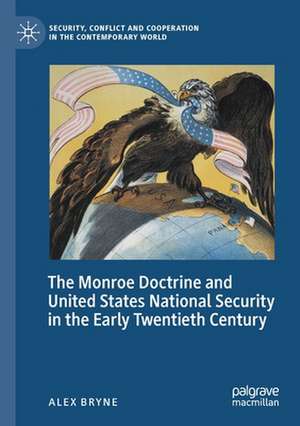The Monroe Doctrine and United States National Security in the Early Twentieth Century: Security, Conflict and Cooperation in the Contemporary World
Autor Alex Bryneen Limba Engleză Paperback – 21 mai 2021
| Toate formatele și edițiile | Preț | Express |
|---|---|---|
| Paperback (1) | 384.86 lei 6-8 săpt. | |
| Springer International Publishing – 21 mai 2021 | 384.86 lei 6-8 săpt. | |
| Hardback (1) | 389.88 lei 6-8 săpt. | |
| Springer International Publishing – 20 mai 2020 | 389.88 lei 6-8 săpt. |
Din seria Security, Conflict and Cooperation in the Contemporary World
- 9%
 Preț: 765.10 lei
Preț: 765.10 lei - 20%
 Preț: 689.80 lei
Preț: 689.80 lei - 20%
 Preț: 565.89 lei
Preț: 565.89 lei - 20%
 Preț: 629.10 lei
Preț: 629.10 lei - 18%
 Preț: 785.42 lei
Preț: 785.42 lei - 18%
 Preț: 775.15 lei
Preț: 775.15 lei -
 Preț: 386.61 lei
Preț: 386.61 lei - 15%
 Preț: 584.43 lei
Preț: 584.43 lei - 15%
 Preț: 693.25 lei
Preț: 693.25 lei - 15%
 Preț: 527.97 lei
Preț: 527.97 lei - 15%
 Preț: 638.25 lei
Preț: 638.25 lei -
 Preț: 481.43 lei
Preț: 481.43 lei -
 Preț: 384.09 lei
Preț: 384.09 lei -
 Preț: 383.12 lei
Preț: 383.12 lei -
 Preț: 391.61 lei
Preț: 391.61 lei - 15%
 Preț: 638.76 lei
Preț: 638.76 lei - 18%
 Preț: 778.45 lei
Preț: 778.45 lei - 15%
 Preț: 639.37 lei
Preț: 639.37 lei -
 Preț: 390.63 lei
Preț: 390.63 lei -
 Preț: 385.84 lei
Preț: 385.84 lei - 15%
 Preț: 471.69 lei
Preț: 471.69 lei - 15%
 Preț: 586.55 lei
Preț: 586.55 lei -
 Preț: 385.25 lei
Preț: 385.25 lei -
 Preț: 383.33 lei
Preț: 383.33 lei - 18%
 Preț: 731.10 lei
Preț: 731.10 lei - 18%
 Preț: 891.80 lei
Preț: 891.80 lei - 15%
 Preț: 699.77 lei
Preț: 699.77 lei - 15%
 Preț: 703.20 lei
Preț: 703.20 lei - 15%
 Preț: 588.18 lei
Preț: 588.18 lei -
 Preț: 386.81 lei
Preț: 386.81 lei - 18%
 Preț: 786.36 lei
Preț: 786.36 lei - 15%
 Preț: 638.57 lei
Preț: 638.57 lei -
 Preț: 380.63 lei
Preț: 380.63 lei -
 Preț: 390.63 lei
Preț: 390.63 lei
Preț: 384.86 lei
Nou
Puncte Express: 577
Preț estimativ în valută:
73.65€ • 79.97$ • 61.87£
73.65€ • 79.97$ • 61.87£
Carte tipărită la comandă
Livrare economică 22 aprilie-06 mai
Preluare comenzi: 021 569.72.76
Specificații
ISBN-13: 9783030434335
ISBN-10: 3030434338
Pagini: 246
Ilustrații: X, 246 p. 14 illus., 4 illus. in color.
Dimensiuni: 148 x 210 mm
Greutate: 0.34 kg
Ediția:1st ed. 2020
Editura: Springer International Publishing
Colecția Palgrave Macmillan
Seria Security, Conflict and Cooperation in the Contemporary World
Locul publicării:Cham, Switzerland
ISBN-10: 3030434338
Pagini: 246
Ilustrații: X, 246 p. 14 illus., 4 illus. in color.
Dimensiuni: 148 x 210 mm
Greutate: 0.34 kg
Ediția:1st ed. 2020
Editura: Springer International Publishing
Colecția Palgrave Macmillan
Seria Security, Conflict and Cooperation in the Contemporary World
Locul publicării:Cham, Switzerland
Cuprins
Introduction: A Cluster of Loyalties.- The Empire of the Monroe Doctrine.- Regional Hegemony and Pan-Americanism.- A Shibboleth and a War.-The Trichotomy of the Treaty Fight.- One Hundred Years Old and Still Going Strong?.- Conclusion: Anything or Nothing.-
Notă biografică
Alex Bryne is a historian of United States foreign relations. He received his PhD from the University of Nottingham, UK, in 2017 and has published research articles in Diplomacy & Statecraft and the Journal of the Gilded Age and Progressive Era.
Textul de pe ultima copertă
This book demonstrates that during the early twentieth century, the Monroe Doctrine served the role of a national security framework that justified new directions in United States foreign relations when the nation emerged as one of the world’s leading imperial powers. As the United States’ overseas empire expanded in the wake of the Spanish-American War, the nation’s decision-makers engaged in a protracted debate over the meaning and application of the doctrine, aligning it to two antithetical core values simultaneously: regional hegemony in the Western Hemisphere on the one hand, and Pan-Americanism on the other. The doctrine’s fractured meaning reflected the divisions that existed among domestic perceptions of the nation’s new role on the world stage and directed the nation’s approach to key historical events such as the acquisition of the Philippines, the Mexican Revolution, the construction of the Panama Canal, the First World War, and the debate over the League of Nations.
Caracteristici
Explores the importance of the Monroe Doctrine in domestic conceptions of US national security in the early twentieth century Investigates how the Monroe Doctrine provided justification for the expanding scope of US foreign relations, aligned to core values of national security Argues that many of these tenets of US national security were more international than American in nature and that these were shaped far beyond US borders
